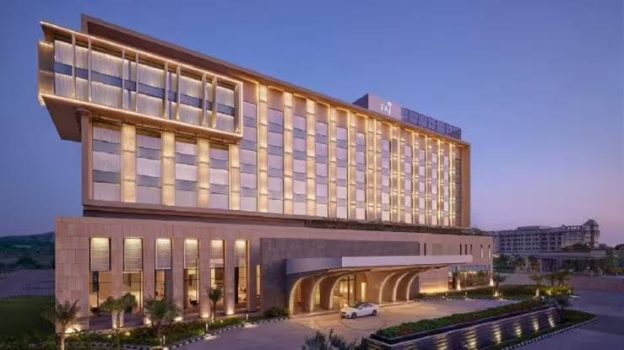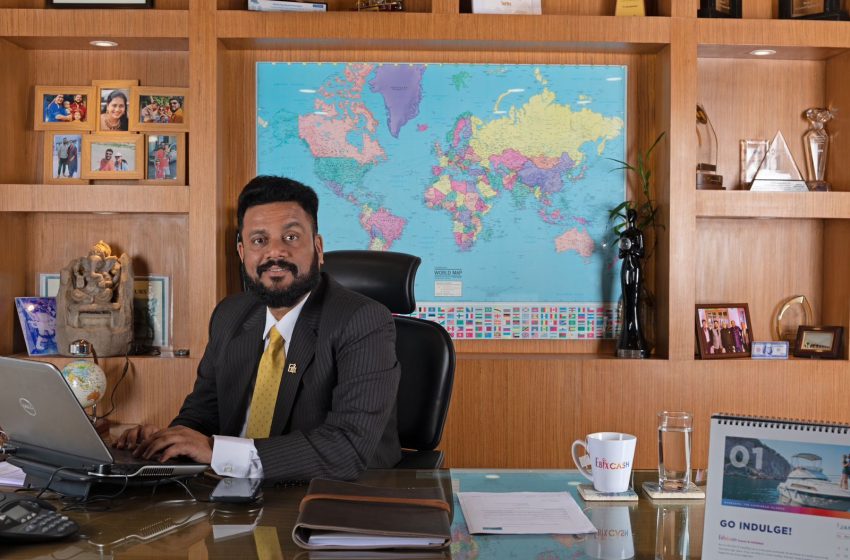Cygnett Hotels & Resorts, a homegrown fast-growing hospitality brand, has been making significant strides in the Indian market with a diverse portfolio ranging from budget to luxury hotels. Founded by Sarbendra Sarkar, the company has rapidly expanded over the last decade, becoming a notable player in India’s mid-segment hotel industry. With ambitious plans to scale its operations, Cygnett aims to have 100 operational hotels in the coming years, solidifying its presence in both Tier 1 and non-metro cities.
In an exclusive interview with Asmita Mukherjee, Sarbendra Sarkar, Founder & MD, Cygnett Hotels & Resorts shares insights into Cygnett’s progress toward its growth goals, strategies to meet the rising demand in India’s expanding hospitality market, and plans to diversify into new verticals like wellness and luxury.
Cygnett was expecting to have 45 operational hotels by 2024. Could you share your progress toward this goal and any challenges you’ve faced?
Cygnett Hotels and Resorts is a dynamic, tech-savvy, and one of the fastest-growing hotel chains, offering a diverse range of hotels from budget to upscale luxury. In just 10 years of operation, the company has rapidly expanded its portfolio, with nearly 50 hotels either operational, in pre-opening stages, or under development. In terms of total aligned properties under the Cygnett brand, including our pipeline projects, we are exceeding our targets. This year has been particularly significant, with multiple signings for our luxury brands, Anamore and Ayurvyaas. Additionally, we’ve seen a strong response in the midscale and value segments, securing 12-15 new properties under the Cygnett Inn, Cygnett Style, and Cozzet brands. I foresee Cygnett continuing a rapid growth trajectory, expanding our presence across India.
As for challenges, there aren’t many, though project timelines remain a key area for improvement, especially in India, where developments can move at a slower pace. That said, we are a tech-savvy company with a strong fundamental, as a company we prioritize transforming and keeping ourselves ahead of time and for future challenges.
As Cygnett moves closer to its goal of 100 properties, what are the key factors driving your growth strategy, and where do you see the biggest opportunities for further expansion? Are there any specific geographical locations you plan to expand in India and abroad?
We are well on track to reach the significant milestone of 100 operational hotels in the coming years. Our growth strategy has been driven by entering markets with a high demand for branded, service-oriented hotels. I see the biggest opportunities in India’s Tier 2 and Tier 3 cities, where there remains a significant gap in branded hotel options. Additionally, the Northeastern region of India offers tremendous potential. With its untapped tourism resources and rapid infrastructure development, we’ve expanded our presence there, recently signing new properties in Dibrugarh, Tawang, Golaghat, and Borpeta. Another key area of growth is the Indian religious circuit, where we see increasing demand for branded hotels due to the rising number of visitors year over year. Furthermore, emerging destinations, particularly those gaining popularity among younger travelers, present significant opportunities for the hospitality sector.
Domestic tourism has become the backbone of the tourism and hospitality industry in India. How do you view the demand from domestic tourists in comparison to international tourists in the coming years?
Even with the pandemic behind us, domestic tourism remains the lifeline of hotels across India. Whether for weekend getaways or weddings, the demand from domestic travellers continues to bosting occupancy higher and fill rooms. Over the next few years, we expect domestic tourism to grow further driven by leisure, business, MICE and wedding segments.
In comparison, inbound tourism has been slower to recover as global economic downturn. However, beginning 2025, I anticipate a strong resurgence in demand from international markets. India apart from being a rich cultural destination is gaining prominence as a MICE hub. The country’s economic growth, and cultural heritage also bodes well for the future growth of inbound tourism.
Cygnett has been active in both greenfield and brownfield projects. Could you share some insights into how you approach these two types of projects and the unique challenges and opportunities they present?
When it comes to greenfield projects, they are full of potential, and we are involved from the very beginning. Our approach starts with comprehensive feasibility studies to assess the market needs, helping us determine the most viable product, the level of investment required, and anticipated ROI. Envisioning the final product is crucial, and we focus on aligning the concept with market demands before moving forward. We also rely on our meticulously developed brand manuals for each of our brands, which guide the design process. Our technical teams work closely to ensure that execution is monitored effectively, ensuring the final product delivers the Cygnetture experience and right return on investment.
In contrast, brownfield projects present fewer opportunities for customization since we come in later during the development phase. However, we focus on optimizing what’s already in place, ensuring the best use of existing structures. Our technical team works diligently to design and adapt within those parameters, while strictly adhering to our brand standards and manuals to deliver a high-quality, efficient hotel without compromise.
Cygnett has a strong presence in the mid-segment market. Are you exploring opportunities in other verticals such as luxury and wellness, or long-stay accommodations?
From day one, we had plans to add the luxury segment to our portfolio, and I am pleased to tell you that we are well on track to introduce our luxury hotel brand soon. Anamore is the upscale brand of Cygnett Hotels & Resorts. At Anamore, it’s more than just a hotel stay; it’s about offering luxuriously comfortable accommodations and a wide range of premium facilities. We have signed more than a couple of Anamore properties in the country, and they are currently in the development stage.
In terms of wellness, which is one of the top tourist trends in 2024 and a key priority for today’s travelers, we are also ahead of the curve. We have Ayurvyaas, a lifestyle and wellness brand under Cygnett Hotels & Resorts, and to meet this growing demand, we will soon be introducing our first Ayurvyaas property, set to open in February 2025. It will offer a holistic wellness experience that combines ancient Vedic wisdom with modern practices. Ayurvyaas is designed to provide physical, mental, and spiritual rejuvenation, ensuring a comprehensive and transformative stay for our guests.
What sets Cygnett Hotels & Resorts apart from other hospitality brands in India, particularly in the budget and mid-market segments?
Our vision is to provide comfortable accommodation and exceptional hospitality to our valuable guests. We deliver what we call the ‘Cygnetture’ experience which translates into quality hotels, prime locations, value for money, safety, consistent service, excellent food and sustainable practices. All our hotels reflect cygnetture experience for our guests not just in pretty words but also in action. We understand the value of a good night’s sleep, a meal that hits the spot, it makes you feel cherished, and prices that suit the pocket. We don’t promise, we deliver. Our strategic focus goes beyond geographical expansion and includes operational excellence, personalization and being sustainable. The second most valuable thing which sets us apart is the tech savvy nature of the company to enhance guest experience and more productive outcomes. Predominantly at cygnett, we start using AI driven technologies to let guests know what they are going to experience even before they arrive, and the big data to deliver tailormade experiences for an exceptional Hospitality and our trademark Cygnetture experience to every guest.
We have a diverse portfolio of budget and mid-market brands such as Cygnett Inn, Cygnett Style, Cygnett Retreat and Cozzet Hotels. These brands are known for offering clean rooms, convenient locations, modern amenities and outstanding service. The budget and mid-market brands of Cygnett Hotels & Resorts ensure a reliable and satisfying experience for every guest.
Cygnett has been expanding into new locations like Vrindavan, Bhiwadi, Dibrugarh, and Ahmedabad, and launching new brands like Ayurvyaas and Cozzet. Could you share more about these new properties and the unique selling points (USPs) they bring to your portfolio?
Ayurvyaas itself is a USP for the Cygnett, not many major players of hospitality is having such a Wellness & Life Style brand. Ayurvyaas, offers its guests premium spaces with spectacular views combined with the supreme luxury & life style wellness and exceptional hospitality one has ever experienced. With specialist staff and upscale facilities, the brand resonates the gIobaI character. Ayurvyaas is our lifestyle and wellness brand. Ayurvyaas brings balance to its guests’ lifestyle through traditionally trusted and proven therapies prescribed after a detailed consultation with our in-house wellness and contemporary techniques experts.
Whereas, Cozzet brand is widely known for offering clean rooms, convenient locations, modern amenities and exceptional service. Positioned as a smart, safe and sensible budget segment brand, Cozzet goes beyond the traditional approach to hospitality offering a fresh and radical experience at an affordable price point. Despite offering affordable prices, Cozzet hotels prioritize cleanliness and hygiene, ensuring clean rooms, sparkling floors, and crisp linen. Exceptional service is another hallmark of Cozzet hotels. The staff is committed to providing prompt and cygnetture service to meet the needs of every guest.
Do you see any emerging cities or regions in India where the demand for hotel accommodations is rising rapidly? What factors are driving this growth, and how does Cygnett plan to meet this demand?
India’s non-metro cities are at the heart of the country’s hospitality growth, offering immense potential and untapped opportunities across various regions. Smaller cities and towns are increasingly becoming key markets for branded hospitality players with strong demand from the leisure, business and wedding segments. Economic activity is on the rise in tier-I, tier-II and tier-III cities which is further driving the need for quality accommodations.
Moreover, initiatives like the Indian government’s Smart Cities Mission are accelerating infrastructure development in these areas. As the quality of life improves in smaller cities, the demand for branded hotels is also steadily increasing. The demand is also being fueled by the expanding middle class and the growth of small and medium-sized enterprises (SMEs).
How do you view the current demand and supply equilibrium in the Indian hospitality sector, especially in Tier 2 and 3 cities? Do you see a growing need for more properties in these regions?
As I mentioned earlier, the demand is ever growing for quality hotels in non-metro cities. As per a recent CareEdge report, India has approximately 166,000 branded hotel rooms. Over the next five years, the industry is projected to add around 55,000 new rooms, with supply growing at a Compound Annual Growth Rate (CAGR) of 4.5-5.5%. Despite this anticipated growth, the demand for hotel accommodations is expected to continue outstripping supply. We definitely see a growing need for more properties in these regions and will accordingly continue to enter these markets with different brands of ours.
RevPAR (Revenue per Available Room) and occupancy rates are key metrics in the hospitality industry. How has Cygnett performed in these areas across its portfolio, and what strategies are in place to further improve these metrics?
At Cygnett, we’ve seen consistent growth in both RevPAR and occupancy rates across our portfolio, driven by our strategic focus on markets with strong demand for branded, service-oriented hotels. In particular, our properties in Tier 2 and Tier 3 cities have performed exceptionally well, as these locations present untapped potential with growing demand for quality accommodations. To further enhance these key metrics, we have implemented several strategies. First, we focus on optimizing our pricing models through dynamic pricing and real-time data analytics, ensuring that we remain competitive while maximizing revenue. Additionally, our regional sales team, and our CRS call center also contribute significantly in higher occupancy rates. Plus, our and service design and personalized guest experiences contribute hugely on guest retention. We also place a strong emphasis on digital marketing and distribution, leveraging technology to increase our online visibility and reach. In terms of operational efficiency, our tech-driven approach helps reduce costs while maintaining high service standards, ultimately improving profitability per room.
With occupancy levels fluctuating in different regions, which cities are currently showing the highest demand, and how is Cygnett positioning itself to capture this demand?
Occupancy levels can vary across regions, but we’ve observed particularly strong demand in PAN India overall. Especially Tier 2 and Tier 3 cities, as well as key emerging regions like the Northeast. Cities such as Jaipur, Lucknow, and Tezpur, Itanagar, Bhuvneshwar along with tourism destinations like Nainital and Ayodhya, are showing high occupancy rates driven by increased domestic travel, rising business hubs, and untapped tourism potential.
Cygnett has strategically positioned itself to capture this demand by expanding our presence in these high-growth markets. We’ve focused on delivering branded, service-oriented hotels in cities that traditionally lack high-quality accommodation options. Our midscale and value hotel brands, including Cygnett Park, Cygnett Resort, Cygnett Inn, Cygnett Style, Cozzet are tailored to meet the needs of both business and leisure travelers in these regions. Additionally, we continue to leverage technology and data analytics to fine-tune our marketing efforts, ensuring that we reach the right customer segments and maximize occupancy. We’re also focusing on forging local partnerships and enhancing our guest experience to solidify Cygnett’s brand presence and build loyalty in these rapidly growing markets. As demand surges in these areas, we are well-prepared to cater to the needs of today’s discerning travelers.
Post-COVID, the industry has struggled with a shortage of skilled manpower. How is Cygnett addressing this challenge, particularly in terms of hiring and retaining talent?
The industry is facing a whopping over 60 percent demand-supply gap in manpower with hotels expanding at the rate of 18 to 20 percent per year, the shortage of skilled manpower is being foregrounded at each level of the hospitality sector. Industry estimates suggest that around 25% to 30% of the skilled and experienced workforce in the hospitality sector permanently shifted to other professions during the pandemic. This has resulted in a significant shortage of trained personnel in the sector.
I believe that for attracting the young talent in our business we need to rebrand the hospitality industry as a vibrant and lifestyle-driven sector. Invest in training and development, Embrace technology, and offer competitive wages, benefits, and opportunities for career advancement to improve retention rates, is what we believe in Cygnett. As a responsible hospitality company, we have introduced the Comprehensive Cygnett Leadership Development Program (CLDP) to prepare our future leaders. The Cygnett Learning Academy has also played a key role in fostering a culture of learning in our young team members and acquire new skills throughout their careers.
Cygnett has introduced the affordable brand ‘Cozzet’ in key locations. What are the expansion plans for Cozzet, and how does it complement your existing portfolio of budget and mid-market hotels?
Cozzet is one of our fastest-growing brands. Recently, we have launched Cozzet Bindal in Jamshedpur, Cozzet Deera in Sonipat and Cozzet Victoria in Bhubaneswar. The brand is expanding its footprint in several key locations including Jamshedpur – the steel city of India along with Mahad, a thriving business hub near Navi Mumbai and other destinations such as Puri, SIDCUL Haridwar, Chittorgarh and Phalodi in Rajasthan.
We plan to open 3-4 hotels under the Cozzet brand annually. Like our other budget and mid-market brands, Cozzet focuses on providing exceptional service at a competitive price. It caters to the needs of modern young travellers, offering essentials such as clean rooms, fast internet, quality service and delicious food.
You’ve highlighted the increasing spending power in non-metro cities. How is Cygnett leveraging this trend, and what role do government initiatives play in supporting your expansion into these markets?
Cygnett has strategically recognized the growing spending power in India’s non-metro cities, and we are actively leveraging this trend to expand our presence in these high-potential markets. Tier 2 and Tier 3 cities are seeing a surge in demand for branded, service-oriented hotels due to increased domestic travel, growing business activities, and rising aspirations of travelers in these regions. We are addressing this need with our midscale and value brands like Cygnett Inn, Cygnett Style and Cozzet, which offer quality accommodations at competitive price points.
Government initiatives play a crucial role in supporting our expansion. Programs like the UDAN scheme, aimed at enhancing regional air connectivity, have made travel more accessible to these cities, boosting tourism and business travel. The focus on infrastructure development through projects such as Smart Cities and improved road and rail networks also facilitates easier access to non-metro regions, making them more attractive to both leisure and business travelers. Moreover, the government’s push for religious and heritage tourism has opened new opportunities for us in destinations along India’s religious circuits. Cygnett is aligning with these initiatives by developing properties in locations like Ayodhya, Vrindavana and Ujjain catering to the rising number of visitors in these areas. By combining government support with our market-focused approach, Cygnett is well-positioned to capture the increasing demand in non-metro cities and further drive our growth across India.
Q 15. With the rise of online booking platforms and the growing demand for value-for-money accommodations, how is Cygnett using technology to enhance the guest experience and stay competitive in the budget hotel segment?
A. Today, nobody doubts that technology and travel are the perfect combination. This joint force also plays a crucial role in the way we travel, from the vacation destination we choose, all the way to what we do once we’re there and even in the time after we’ve come back from our adventure. It is so prevalent, that according to a Google Travel study, 74% of travellers plan their trips on the Internet, while only 13% still use travel agencies to prepare them. Cygnett being a tech-savvy company always embraces the technology to deliver better. Predominantly at Cygnett, we are using mobile applications the cell phone has become the tour guide, travel agency, best restaurant locator, map, and more. It’s by our side during the entire purchase journey., VR/AR technology is next as this lets you see the top of the world without having to climb to the top. We have incorporated virtual tours to let guests know what they are going to experience even before they arrive, and the big data to deliver tailormade experiences for an exceptional Hospitality and our trademark Cygnetture experience to every guest.






